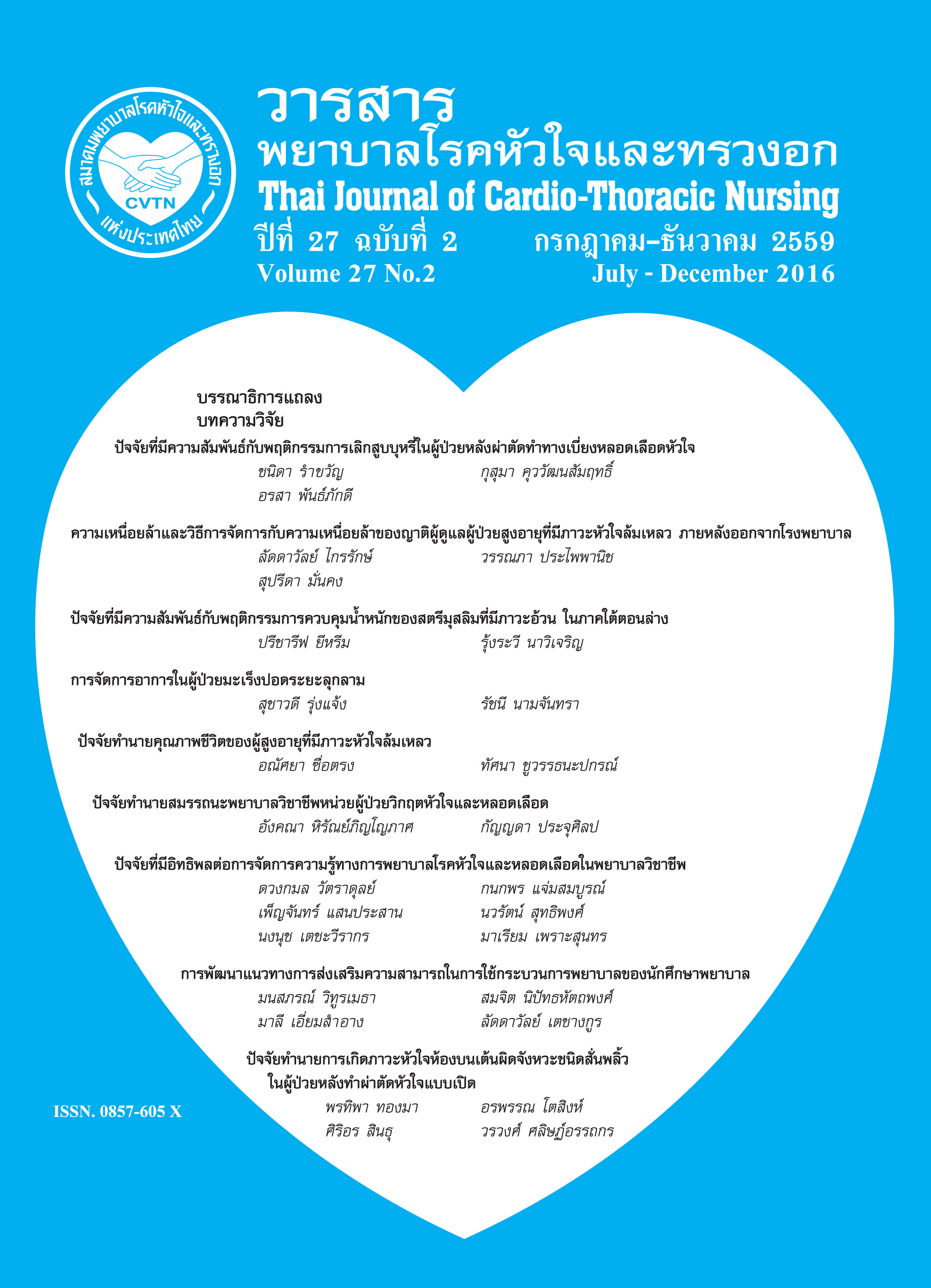ปัจจัยที่มีความสัมพันธ์กับพฤติกรรมการควบคุมน้ำหนักของสตรีมุสลิมที่มีภาวะอ้วนในภาคใต้ตอนล่าง
คำสำคัญ:
ภาวะอ้วน, พฤติกรรมการควบคุมน้ำหนัก, สตรีมุสลิม, obesity, body weight control behaviors, Muslim womenบทคัดย่อ
การวิจัยครั้งนี้ เป็นการวิจัยเชิงพรรณนาแบบหาความสัมพันธ์ (descriptive correlational research) เพื่อศึกษาพฤติกรรมการควบคุมน้ำหนักของสตรีมุสลิมในภาคใต้ตอนล่างและหาความสัมพันธ์ระหว่างปัจจัยการรับรู้ประโยชน์ การรับรู้อุปสรรค การรับรู้สมรรถนะแห่งตน อิทธิพลระหว่างบุคคล อิทธิพลด้านสถานการณ์ และความมุ่งมั่นในการวางแผนการปฏิบัติกับพฤติกรรมการควบคุมน้ำหนักของสตรีมุสลิมที่มีภาวะอ้วนในภาคใต้ตอนล่าง กลุ่มตัวอย่างเป็นสตรีมุสลิมที่อาศัยอยู่ในพื้นที่ภาคใต้ตอนล่าง มีอายุระหว่าง 20-59 ปี มีค่าดัชนีมวลกายเท่ากับหรือมากกว่า 25 กิโลกรัม/ตารางเมตร จำนวน 384 ราย ได้มาโดยการสุ่มแบบหลายขั้นตอน เครื่องมือที่ใช้ในการเก็บรวบรวมข้อมูลเป็นแบบสอบถาม วิเคราะห์ข้อมูลโดยการหาค่าร้อยละ ค่าเฉลี่ย ส่วนเบี่ยงเบนมาตรฐาน และวิเคราะห์ความสัมพันธ์โดยใช้สัมประสิทธิ์สหสัมพันธ์ของเพียร์สัน
ผลการวิจัย พบว่า พฤติกรรมการควบคุมน้ำหนักของสตรีมุสลิมที่มีภาวะอ้วนในภาคใต้ตอนล่างอยู่ในระดับปานกลาง (mean= 3.43, S.D. = 0.43) ปัจจัยการรับรู้ประโยชน์ ปัจจัยการรับรู้สมรรถนะแห่งตน ความมุ่งมั่นในการวางแผนปฏิบัติ อิทธิพลด้านสถานการณ์ และอิทธิพลระหว่างบุคคลมีความสัมพันธ์ทางบวกกับพฤติกรรมการควบคุมน้ำหนักของสตรีมุสลิมที่มีภาวะอ้วนในภาคใต้ตอนล่างอย่างมีนัยสำคัญทางสถิติที่ระดับ .05 (r = 0.30, 0.50, 0.70, 0.54 และ 0.35 ตามลำดับ) ปัจจัยการรับรู้อุปสรรคไม่มีความสัมพันธ์กับพฤติกรรมการควบคุมน้ำหนักของสตรีมุสลิมที่มีภาวะอ้วนในภาคใต้ตอนล่าง (r = -.03)
ผลการวิจัยสามารถนำมาใช้เป็นแนวทางในการส่งเสริมพฤติกรรมการควบคุมน้ำหนักของสตรีมุสลิมที่มีภาวะอ้วนที่เกี่ยวกับการบริโภคและการออกกำลังกาย เพื่อลดปัจจัยเสี่ยงต่อการเกิดโรค โดยเฉพาะโรคเรื้อรังต่างๆ
Factors related to body weight control behaviors among obese muslim women in lower southern region, Thailand
This descriptive correlational research aimed to study body weight control behaviors in obese Muslim women in lower southern region and to examine the association between perceived benefits, perceived barriers, perceived self-efficacy, perceived interpersonal influence, perceived situation influence and the commitment to a plan of action with body weight control behaviors among obese Muslim women in lower southern region, Thailand. The subjects were obese adult Muslim women, aged 20-59 years with a body mass index (BMI) greater than or equal to 25 kg/m2. The 384 Thai Muslim women were selected by a multi-stage stratified random sampling method. Research instruments for data collection were self-administered questionnaires. Percentage, mean, standard deviation and Pearson’s correlation coefficient were used for data analysis.
The research results were as follows: mean score of body weight control behaviors among obese Muslim women was at the medium level (mean = 3.43, S.D. = 0.43). There were positive statistical correlations between perceived benefit, perceived self-efficacy, commitment to a plan of action, situation influence, interpersonal influence and bodyweight control behaviors in obese Muslim women at the significant level of .05 (r = 0.30, 0.50, 0.70, 0.54, and 0.35 respectively). There was no statistical correlation between perceived barrier and body weight control behaviors among obese Muslim women in lower southern region. (r = -.031).
The result should be used as guideline to promoting body weight control behaviors among obese Muslim women such as food intake and exercise behaviors in order to decrease risk factors of chronic diseases.
ดาวน์โหลด
รูปแบบการอ้างอิง
ฉบับ
ประเภทบทความ
สัญญาอนุญาต
บทความนี้ยังไม่เคยตีพิมพ์หรืออยู่ในระหว่างส่งไปตีพิมพ์ในวารสารอื่น ๆ มาก่อน และกองบรรณาธิการขอสงวนสิทธิ์ในการตรวจทาน และแก้ไขต้นฉบับตามเกณฑ์ของวารสาร ในกรณีที่เรื่องของท่านได้ได้รับการตีพิมพ์ในวารสารฉบับนี้ถือว่าเป็น ลิขสิทธิ์ของวารสารพยาบาลโรคหัวใจและทรวงอก






